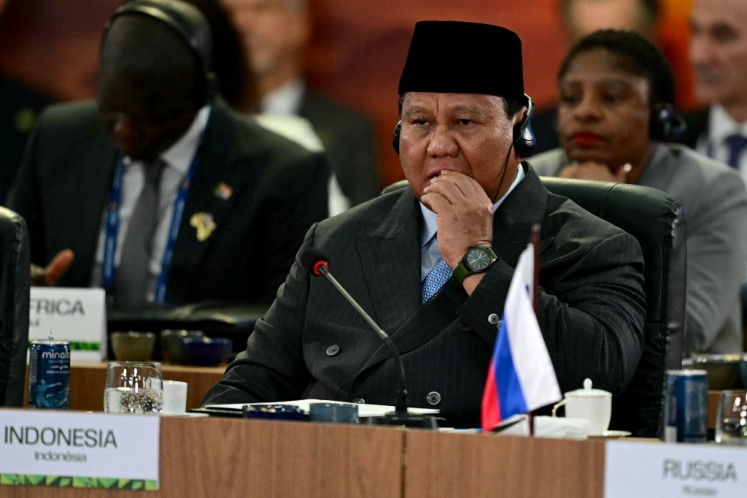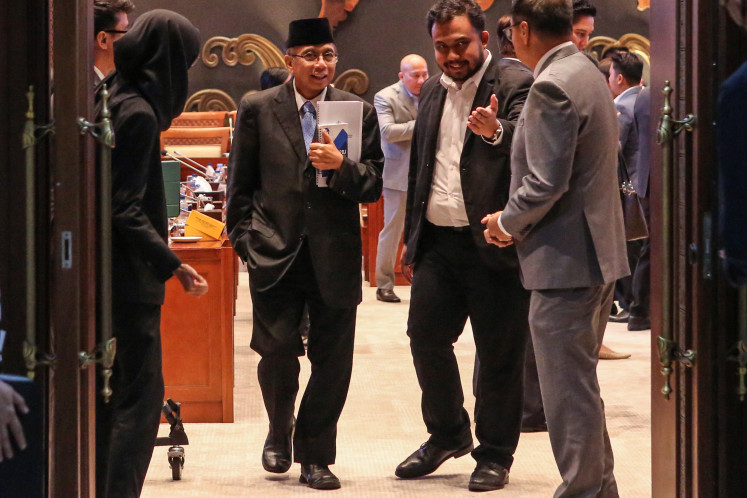Popular Reads
Top Results
Can't find what you're looking for?
View all search resultsPopular Reads
Top Results
Can't find what you're looking for?
View all search resultsBehind tax-shortfall: Rethinking Indonesian taxation
Worst in a decade: Coordinating Economic Minister Darmin Nasution talks to reporters at his office in Jakarta
Change text size
Gift Premium Articles
to Anyone
 Worst in a decade: Coordinating Economic Minister Darmin Nasution talks to reporters at his office in Jakarta. The government has launched a series of economic packages, with some focusing on tax incentives, in a bid to stimulate the economy. The country saw an 18 percent tax revenue shortfall in 2015, the worst in at least a decade. (tempo.co) (tempo.co)
Worst in a decade: Coordinating Economic Minister Darmin Nasution talks to reporters at his office in Jakarta. The government has launched a series of economic packages, with some focusing on tax incentives, in a bid to stimulate the economy. The country saw an 18 percent tax revenue shortfall in 2015, the worst in at least a decade. (tempo.co) (tempo.co)
W
span class="caption">Worst in a decade: Coordinating Economic Minister Darmin Nasution talks to reporters at his office in Jakarta. The government has launched a series of economic packages, with some focusing on tax incentives, in a bid to stimulate the economy. The country saw an 18 percent tax revenue shortfall in 2015, the worst in at least a decade. (tempo.co)
In his opening remarks at the Indonesia Stock Exchange (IDX) on the first trading day of the year on Jan. 4, President Joko 'Jokowi' Widodo stated that 2015 had been a tough year, one that was full of challenges, especially in the finance sector.
Later, as if to counter his optimism, the Jakarta Composite Index (JCI) dropped that morning. The lackluster Chinese stock market appeared to have overshadowed the bright Indonesian outlook predicted by Jokowi that morning.
Looking at the domestic front, fair achievements were made, with 4.7 percent economic growth, just slightly below the government's target of 5 percent. This was achieved amid a sluggish world economy, which is not easy.
'Many people doubt state budget realization. But you could ask the coordinating economic minister and the finance minister about how I personally oversee state revenue every morning and every night at midnight,' said Jokowi.
Tax revenue has indeed reached a new record, above Rp 1 quadrillion for the first time in Indonesian history. However, the sky-roof tax revenue in 2015 which was targeted at Rp 1.29 quadrillion, a 14 percent increase from the 2014 target of Rp 1.07 quadrillion, ended with a poor score.
There was a tax shortfall of about 18 percent, an Rp 234 trillion deficit, with the Finance Ministry booking only Rp 1.06 quadrillion in tax revenue. The 18 percent shortfall, according to 2005-2015 budget reports compiled by thejakartapost.com, was the worst shortfall in the last decade.
Amid the situation, the Jokowi administration has set a high-bar for the tax-revenue target in 2016 at Rp 1.36 quadrillion, a 5 percent increase year on year, which has been met with skepticism.
Huge potential
However, tax observer Parwito argued that the 5 percent increase in the tax target was conservative because it represented natural growth in a very big pond of 'tax fish', especially since the economy had experienced a 5.5 percent compounded annual growth rate in the last five years.
'I'd say that tax officers do not have to make extra effort to reach that target. They can just sit back and wait for taxpayers to pay. But the problem is they are too lazy, they don't want to perform well, especially amid a bad tax administration,' he told thejakartapost.com on Tuesday.
Looking at the tax revenue of 82 percent of the 2015 target, he underlined that the problem was not a sluggish economy, which Coordinating Economic Minister Darmin Nasution and Finance Minister Bambang Brodjonegoro blamed for the missed target.
Parwito rejected that suggestion, saying that the problem was more technical, such as a limited number of tax officers, poor tax administration, obsolete technology, unproductive tax officers -- despite an increase in their remuneration -- and a lack of access to bank data.
Assuming that Indonesia experienced a crisis in 2015 with minus economic growth, he argued that the tax office could still attempt to collect back taxes from as far back as five years, or to 2010, during its collection statute expiration date (CSED). Before the 2007 Tax Law was revised, the expiration date was 10 years.
As a former tax director general (holding office from 2006 to 2009), Darmin should know this, Parwito said. This is how the tax office works, by collecting current tax liabilities as well as back taxes. Thus, tax collection does not necessarily have to be in line with economic conditions.
'Therefore, during the president Gus Dur era in 1999 when economic growth was near zero [0.62 percent], the tax office managed to meet the target by almost 99 percent because it collected corporations' back taxes, up to 10 years before,' Parwito explained.
He said tax officers could perform much better if the 'Gayus mentality' was totally purged from the office. Gayus Halomoan Tambunan was a notorious tax officer who was found guilty of accepting Rp 925 million in bribes from tax consultant Robertus Santonius to influence a tax claim filed by PT Metropolitan Retailmart. Despite his prison sentence, Gayus was seen at a tennis match in Bali in 2010 and dined outside of prison walls in 2015, sparking public outcry.
Tax Shortfall (2010-2015)
All the internal problems in the tax office have led to a low tax ratio and limited tax base. Based on the tax agency's latest published data (March 2015), only 28 million workers in the country had tax numbers (NPWPs) out of the 50 million to 60 million workforce. On top of that, only half of 28 million workers with NPWPs routinely submitted tax returns or regularly paid income tax.
Data on institutional taxpayers paints an even worse picture. The latest data, published in 2014, show that of the 1.2 million companies that have NPWPs, only 46 percent of them or some 550,000 companies submitted tax returns.
And the rest? Untraceable.
It is no wonder then that Indonesia is among the countries whose tax ratio' total tax revenue against gross domestic product (GDP)'is very low, just 12 percent. It is far below that of Vietnam (13.8 percent), Singapore (14.2 percent), the Philippines (14.4 percent), Malaysia (15.5 percent) and Thailand (17 percent).
Jokowi, during his presidential campaign, pledged to increase the tax ratio to 16 percent. But looking at his first year in office, nothing seems to have changed. The ambitious target of 2015 has yet to be followed up with better tax policies and administration.
Indeed, some measures have been taken, such as offering a tax amnesty, tax incentives for asset revaluation and other tax incentives to ultimately boost tax income. But the realization and the results have yet to be seen as it may take years before there is an impact.
It is normal then to hear much criticism of the ambitious 2016 tax-revenue target and recommendations to revise down the target to a 'more realistic level', as advised by University of Indonesia taxation expert Darussalam.
It is expected that the finance minister, who is scheduled to attend the tax office's executive meeting (Rapim) on Jan. 12, will evaluate the tax office's performance, get closer to the core problems and come out with scalable tax reformation programs on taxation regulations (Tax Law revision) and administration'.***










